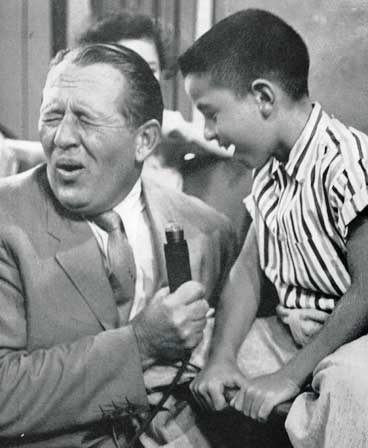“Who would you pick as famous parents if you could live with two celebrities?” Art Linkletter asked a little girl. “You as father,” the girl said, “and Zsa Zsa Gabor as our mother.” Linkletter thought pairing him with the glamorous movie star made for an unusual combination and asked the girl why. “I think we could have a lot of fun with you,” she said, “and you could have a lot of fun with her!”
The above was an anecdote from a 2004 issue of The Saturday Evening Post, written when Linkletter was a mere kid of 91. But the famous host wasn’t new to the Post by any means. The May 17, 1952, issue featured a story on Stalin’s First Lieutenant, Part 8 of a series on British Prime Minister Winston Churchill, and an article about the almost forty-year-old host of radio and TV shows People Are Funny and House Party, one Arthur Gordon Linkletter, a gentle humorist we lost this week at age 97.
A graduate of San Diego State College with an A-minus average and every intention of becoming an English teacher, Linkletter “has been known to dumbfound whole boothfuls of hard-boiled Hollywood Brown Derby lunchers … by bursting into fourteenth-century verse in Chaucerian English,” the 1952 article reported. The same article reminds us that this man “has made a fortune out of slapstick.”
The most popular, and most remembered, segment of House Party were his interviews of school kids. In a three-part Post series in 1957 entitled “Kids Say the Darndest Things,” he discussed how his interrogation methods evolved.
“In the weeks before the curtain goes up, Junior is indoctrinated, coaxed, threatened and rehearsed by his family. Once we’re on the air, I attack this defensive position by asking, ‘What did your mommy tell you not to say?’” The answers, Linkletter wrote, “are wonderful.” Such as: “My mother told me not to tell any of the family secrets, like the time she dyed her hair blond and it came out purple.” Another replied “My daddy told me … no matter where it itches, don’t scratch anywhere.”
Perhaps even more intriguing was a five-part series entitled “Confessions of a Happy Man” that began in the August 27, 1960, issue. It is surprisingly revealing, since it begins by discussing the parents who gave him up when he was a few weeks old. It was a painful subject, but Linkletter forged ahead “because my experience may be of some comfort to an adopted child …”
He was equally frank about being indicted by a Federal grand jury during World War II for “falsely claiming to be a United States citizen – I was actually a Canadian,” and about his slow-to-rise but undeniable temper. When a young director blew up at children who accidentally wandered onto his set, Linkletter let him have it on the air, calling him “an arrogant young pup who is throwing his weight around.”
With friends like Clark Gable and Groucho Marx, he could, perhaps, be forgiven for lapsing into show biz “jargon and shoptalk.” He once passed his son Jack’s room and paused to listen to his bedtime prayers. “Thank you, God. Amen. Listen in again tomorrow night, same time, same station, for another in this series.”
Art Linkletter is survived by his lovely wife of seventy-five years (!), Lois, of whom he writes in “My Zany Rise to the Top.”
Read “Art Linkletter Says the Darndest Things!” by Patrick Perry, March/April 2004 [PDF]
Read “My Zany Rise to the Top,” by Art Linkletter. September 17, 1960 [PDF]
Become a Saturday Evening Post member and enjoy unlimited access. Subscribe now




Comments
What made Art Linkletter a great entertainer–as well as a great man–were his trademark eclectic curiosity and his obvious determination to love and enjoy life. Above all, he was decent.
Unfortunately, I fear Linkletter’s brand of hopeful wholesomeness will find little appreciation–or even, understanding–in the bleak future we could now be entering.
I pray I’m wrong.